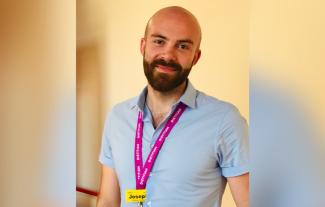I try to show myself the empathy I show others

When he moved to London to develop his career in a job that involves a lot of talking, Dietitian Joe Carvell noticed he was stammering more. But dealing with it is about being kind to yourself and focusing on other people, he explains.
I always knew that I wanted to work in health, and when it was time to do work experience, I went straight to the NHS to see what I wanted to do. I was in awe of what a Dietitian did — talking to people one on one and in groups, educating and supporting them to make healthy changes to their diet. Being a young person with a stammer, it seemed the ultimate goal and challenge for me to try and be this person.
My stammer has moved in cycles throughout my life, and I’ve gone from being very confident and fluent to being very dysfluent, avoiding words, blocking and suffering the constant anxiety that goes with those dysfluent times. The bad times used to last months but these dysfluent periods have gotten shorter with age, reflection, and being kind to myself.
Mentally exhausting
Working in a job where I have to communicate verbally all day, every day, is a blessing and a curse. I get many opportunities to talk and build my confidence, but that also comes with the risk of having a bad day and blaming myself, thoughts such as: have I let my patients down by being dysfluent? and what must they think of me when they leave my clinic room or group education? What sort of person with a stammer chooses a job where they never get a break from having to talk?! A glutton for punishment, my friends say!
I think our harshest critic and most vocal doubter is often ourselves.
I recently tried to describe how a stammer felt, mentally, to a colleague over a pint after work. I said it was like having 50% of your conscious thought on trying to contain the stammering anxiety to get through the day. He said that sounds exhausting. With a laugh, I said, “You know what, it is!”
Work diary
I decided to keep a brief diary of a day’s fluency. For me it felt like a rollercoaster to record. Here is an extract:
- The hot desking office is busy and the receptionist wants to put a patient’s call through to my extension number. I wasn’t prepared and start to panic. I ask her to hold while I scramble around for a quiet room. I manage to find one and take the call in there. I stammer, but I manage to resolve the call.
- I have a patient who has a family member and a translator in the room. I feel pressured by the situation and spend what seems like a whole minute word-avoiding and doing ‘lead-up’ sentences just to say that I am a ‘Dietitian called Joe’ — words I have to say and just can’t get out the first time.
- I have to cold call a patient I haven’t met in person before, which is always my biggest daily challenge. I use the end of my lunch break to sit and be mindful. I practice my introduction and record it to see how it sounds. I make the call, blocking on the first sentence. I throw in a few lead-in words to say who I am and why I’m calling. The rest of the call goes OK and I hang up. I have sweated profusely and realise afterwards that I had been pacing around a hot room while making the call.
Focusing on the other person
Something I have taken from my practise and training that has helped me, is that I try not to focus on me and my stammer, but I focus instead on the other person. I think to myself, what can I do with my voice, my body language and the words I’m saying to help that person feel more comfortable and safe to open up to me about what can be very personal problems and issues around food? I want the best outcome possible for them from our conversation, so all of my energy goes into that, taking my mind off of my own anxieties.
I moved to London a year ago from Shropshire, leaving my support network behind in the pursuit of my career and development. It has not been easy and I noticed an increase in dysfluency, probably because of constantly meeting new people and going into intimidating situations. It was very easy for me to think that I had over-reached myself and couldn’t do it. Again, I went back to being kind to myself. Things are difficult but I’m still here, still working and communicating, and trying my best for the patients.
I think being a person who stammers, our harshest critic and most vocal doubter is often ourselves, so I try to show myself the empathy I show others, and keep trying to be positive and proud of what I have achieved.
For information on coping and getting support in your job, see our At Work & Job Hunting section.
Read more Your Voice articles.
Would you like to write an article? See Submit Something For The Site or email editor@stamma.org for details.

































